Morrisey Surname Ancestry ResultsOur indexes 1850-1950 include entries for the spelling 'morrisey'. In the period you have requested, we have the following 23 records (displaying 1 to 10): Single Surname Subscription | | | Buying all 23 results of this search individually would cost £146.00. But you can have free access to all 23 records for a year, to view, to save and print, for £100. Save £46.00. More... |
These sample scans are from the original record. You will get scans of the full pages or articles where the surname you searched for has been found. Your web browser may prevent the sample windows from opening; in this case please change your browser settings to allow pop-up windows from this site.  British infantry fighting in China
(1856-1860) British infantry fighting in China
(1856-1860)
The China Medal was awarded to soldiers and sailors who took part in the prosecution of the war against the Chinese from 1856 to 1860. Separate clasps were awarded for men who had been in receipt of the China Medal of 1842; for being actually present at Canton on 28 and 29 December 1857, when that city was bombarded and finally captured; for being actually engaged in the operations which ceased with the first capture of the Taku Forts, 20 May 1858, and led to the Treaty of Tientsin; for being actually present at the capture of the Taku Forts 21 August 1860; and for being actually present before Pekin the day the gate of that city was given up to the allied (British and French) army, viz. on 13 October 1860. The 67th (The South Hampshire) Regiment of Foot, based at Athlone, embarked for India 18 September 1858, and was transferred to China in 1859, taking part in the capture of the Taku Forts and Pekin, and the operations against the Taiping rebels in 1862 to 1863: the right wing was moved to Japan in 1864 for the occupation of Yokohama. The regiment returned to the Cape of Good Hope in 1865, and back to Ireland in 1866.MORRISEY. Cost: £8.00.  | Sample scan, click to enlarge

|  Sailors and marines on board Her Majesty's ship Calcutta
(1856-1860) Sailors and marines on board Her Majesty's ship Calcutta
(1856-1860)
The China Medal was awarded to soldiers and sailors involved in the various actions of the war against China, in which this ship was engaged from 1856 to 1860. The medals were either delivered on board or sent on in 1862: except that many of the men were no longer immediately traceable, and the remarks on the roll show that some medals were not sent on for several years, and some were never sent. After the main roll there is a section showing which of the men also qualified for clasps. Separate clasps were awarded for men who had been in receipt of the China Medal of 1842; for the taking of Fatshan in 1857, Canton in 1857, Taku Forts in 1858, Taku Forts in 1860, and Pekin in 1860. Most of the men on this ship are shown as having been given the Fatshan clasp, for being actually present during the successful operations against the Chinese war junks in the Escapo creek, which commenced 25 May and were finally closed at Fatshan 1 June 1857; the Canton clasp, for being actually present at Canton on 28 and 29 December 1857, when that city was bombarded and finally captured; and the Taku Forts 1858 clasp, for being actually engaged in the operations which ceased with the first capture of the Taku Forts, 20 May 1858, and led to the Treaty of Tientsin.MORRISEY. Cost: £8.00.  | Sample scan, click to enlarge

|  British infantry fighting in China
(1860) British infantry fighting in China
(1860)
The China Medal was awarded to soldiers and sailors who took part in the prosecution of the war against the Chinese from 1856 to 1860. Separate clasps were awarded for men who had been in receipt of the China Medal of 1842; for being actually present at Canton on 28 and 29 December 1857, when that city was bombarded and finally captured; for being actually engaged in the operations which ceased with the first capture of the Taku Forts, 20 May 1858, and led to the Treaty of Tientsin; for being actually present at the capture of the Taku Forts 21 August 1860; and for being actually present before Pekin the day the gate of that city was given up to the allied (British and French) army, viz. on 13 October 1860. The 31st (the Huntingdonshire) Regiment of Foot, based at Chatham, embarked for Corfu 24 January 1853, served in the Crimea, had arrived in India by 1859, and was transferred to China in 1860, returning to England in 1863. The regiment took part in the capture of the Taku Forts.MORRISEY. Cost: £8.00.  | Sample scan, click to enlarge

| Civil Service Appointments
(1861)
The Civil Service Commission published an annual list of all persons who had obtained certificates of qualification for appointment in the various public departments. The list gives full name (surname first); department (such as Post Office, or Inland Revenue); situation (such as Letter-carrier, or Clerk); and date of certificate. Candidates whose names are preceded by a dagger obtained appointments as the result of competition; a double dagger indicates open competition. Those whose names are preceded by an asterisk obtained honorary additions to their certificates either for proficiency in extra subjects chosen by themselves, or for marked proficiency in the prescribed subjects. Then follows a further list of these candidates who had obtained Honorary Additions to their Certificates in this way: giving name (surname and initials); position in the service (department and situation); subjects for which honorary additions were made; and 'extent of knowledge displayed' (such as Creditable, Fair, or Very Creditable). 1 January to 31 December 1861.MORRISEY. Cost: £4.00.  | Sample scan, click to enlarge
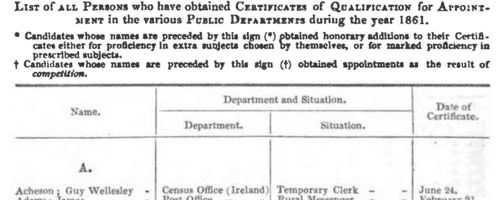
| Long-stay Paupers in Workhouses: St Marylebone
(1861)
This comprehensive return by the Poor Law Board for England and Wales in July 1861 revealed that of the 67,800 paupers aged 16 or over, exclusive of vagrants, then in the Board's workhouses, 14,216 (6,569 men, 7,647 women) had been inmates for a continuous period of five years and upwards. The return lists all these long-stay inmates from each of the 626 workhouses that had been existence for five years and more, giving full name; the amount of time that each had been in the workhouse (years and months); the reason assigned why the pauper in each case was unable to sustain himself or herself; and whether or not the pauper had been brought up in a district or workhouse school (very few had). The commonest reasons given for this long stay in the workhouse were: old age and infirm (3,331); infirm (2,565); idiot (1,565); weak mind (1,026); imbecile (997); and illness (493). MORRISEY. Cost: £6.00.  | Sample scan, click to enlarge

|  Men of the 40th Regiment who fought in the New Zealand War
(1863-1870) Men of the 40th Regiment who fought in the New Zealand War
(1863-1870)
New Zealand War Medal roll for the 40th (2nd Somersetshire) Regiment of Foot: for service in the New Zealand campaign 1863 to 1866: the rolls were compiled following a general order in 1869 and the medals were distributed in 1870. The regiment, although called the 2nd Somersets, was based at Birr in Offaly. It embarked for New South Wales 14 July 1852, and was moved to New Zealand in 1860; the men returned to England in 1866, and thence back to Ireland in 1869.MORRISEY. Cost: £8.00.  | Sample scan, click to enlarge

| Infants in Wexford Workhouse
(1872)
Return, “with Christian and Surname of each, of Infants Born in Irish Workhouses, or Admitted thereto when Healthy under Twelve Months Old, and attempted to be Reared therein during the Years 1872 to 1874, showing what has since become of them”. The returns from each poor law union workhouse give: Christian and Surname of Infant Born in the Workhouse, or Admitted Healthy, under Twelve Months; Year; and whether discharged, healthy, in hospital, or dead.
MORRISEY. Cost: £6.00.  | Sample scan, click to enlarge
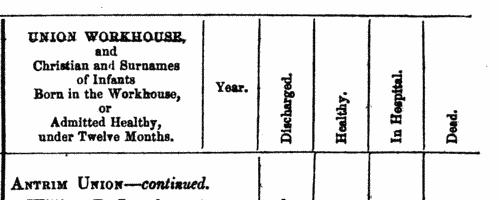
| Infants in Wexford Workhouse
(1873)
Return, “with Christian and Surname of each, of Infants Born in Irish Workhouses, or Admitted thereto when Healthy under Twelve Months Old, and attempted to be Reared therein during the Years 1872 to 1874, showing what has since become of them”. The returns from each poor law union workhouse give: Christian and Surname of Infant Born in the Workhouse, or Admitted Healthy, under Twelve Months; Year; and whether discharged, healthy, in hospital, or dead.
MORRISEY. Cost: £6.00.  | Sample scan, click to enlarge
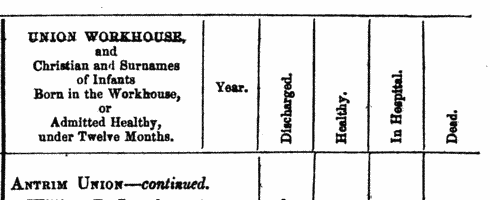
| Infants in Wexford Workhouse
(1874)
Return, “with Christian and Surname of each, of Infants Born in Irish Workhouses, or Admitted thereto when Healthy under Twelve Months Old, and attempted to be Reared therein during the Years 1872 to 1874, showing what has since become of them”. The returns from each poor law union workhouse give: Christian and Surname of Infant Born in the Workhouse, or Admitted Healthy, under Twelve Months; Year; and whether discharged, healthy, in hospital, or dead.
MORRISEY. Cost: £6.00.  | Sample scan, click to enlarge
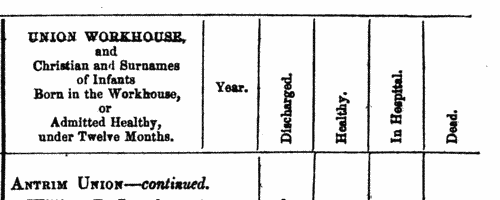
|  Men of the 21st Regiment of Foot (Royal Scots Fusiliers) fighting in South Africa
(1877-1879) Men of the 21st Regiment of Foot (Royal Scots Fusiliers) fighting in South Africa
(1877-1879)
What is commonly called the Zulu War Medal was awarded to those British soldiers who fought in a series of conflicts in southern Africa from 1877 (the Kaffir War) through to 1879 (the Zulu War). In 1880 the various units submitted returns of the officers, non-commissioned officers and men 'entitled to the Medal for Military Operations in South Africa during 1877-8-9' and these 'medal rolls' are now in the National Archives. The returns are made with the information arranged in twelve columns:
1. Rank and name
2. Regimental number and rank at the time the medal was earned
3. Whether in possession of medal for previous wars
4. Whether engaged against the Gaikas, Galekas and other Kaffir tribes 1877-8
5. Whether engaged against Pokwane 1878
6. Whether engaged against the Griquas 1878
7. Whether engaged against the Zulus 1879
8. Whether engaged against Sekukuni as set forth in Par. 2. G. O.
9. Whether engaged against Moirosi's stronghold
10. Entitled to medal without clasp under Par. 4.
11. Serving with regiment, depot, dead, discharged, deserted, &c.
12. Notes and cross-references to the Adjutant-General's medal lists.
WO 100/46.
MORRISEY. Cost: £8.00.  | Sample scan, click to enlarge
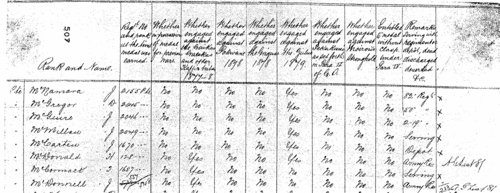
|
Research your ancestry, family history, genealogy and one-name study by direct access to original records and archives indexed by surname.
|













